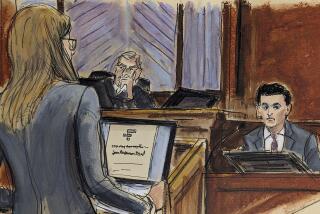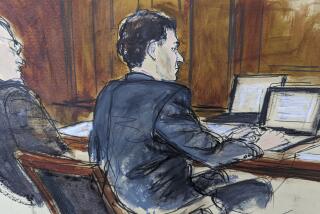WorldCom Founder’s Trial Starts
- Share via
NEW YORK — At a crossroads in the fortunes of the company he practically built from scratch, former WorldCom Inc. Chief Executive Bernard J. Ebbers chose to tell investors “lie after lie after lie,” costing them billions of dollars, a federal prosecutor said Tuesday.
Assistant U.S. Atty. David Anders, in opening statements at Ebbers’ securities fraud trial, said that beginning in October 2000, Ebbers ordered subordinates to “cook the books” of the telecommunications giant to prop up its stock price and protect his huge personal fortune in WorldCom shares.
Defense lawyer Reid Weingarten countered that Ebbers, 63, a former milkman, nightclub bouncer and high-school coach, might be “rough around the edges,” but he is “not capable of committing the crimes alleged by the government.”
Weingarten told jurors that they would easily see through the government’s star witness, former WorldCom Chief Financial Officer Scott D. Sullivan, “a practiced and accomplished liar” with a strong selfish motivation to help deliver a guilty verdict against his former mentor and boss.
Sullivan pleaded guilty to fraud last year and signed an agreement to cooperate in Ebbers’ prosecution. Four other former WorldCom executives also have pleaded guilty and are expected to take the witness stand. Their sentences will be based in part on the prosecution’s recommendations after they testify, Weingarten noted.
Ebbers faces up to 25 years in prison on charges of conspiracy, securities fraud and filing false financial statements.
The government contends that he and Sullivan devised an accounting fraud to falsely inflate WorldCom’s dwindling revenue and hide its rising expenses -- all in a desperate effort to meet Wall Street’s revenue and profit expectations.
“We have to hit the number,” Ebbers kept telling Sullivan and other finance executives, Anders said, a mantra that the prosecutor said was in fact “a command to commit fraud.”
The backdrop was a worldwide glut of telecommunications capacity that followed the collapse of the Internet stock bubble. Ebbers kept promising higher growth, but his promises got harder and harder to keep as the entire industry fell into a slump.
WorldCom’s board forced Ebbers out in the spring of 2002 after adverse publicity about nearly $400 million in loans he had taken out, using his 20 million WorldCom shares as collateral.
WorldCom, based in Clinton, Miss., collapsed later that year in the largest bankruptcy filing in U.S. history, wiping out stock that at its 1999 peak had reached a total value of more than $180 billion.
The company emerged from Chapter 11 bankruptcy in April, operating as MCI Inc. with headquarters in Ashburn, Va.
“When people buy stock in a public company, they purchase the right to be told the truth,” Anders told the 10 women and six men selected as jurors and alternates. “Bernard Ebbers violated that trust by telling lie after lie after lie.”
Dismissing the prosecution’s argument as an oversimplified “docudrama,” Weingarten said that WorldCom had warned investors five times of likely revenue or earnings shortfalls during the period of the alleged conspiracy, from late 2000 through early 2002.
In any case, the defense lawyer said, Sullivan was in complete control of WorldCom’s accounting, an arena where Ebbers had no educational background and little practical expertise. Ebbers was a tough cost cutter who zeroed in on advertising and travel expenses, Weingarten said, but “he never told Scott Sullivan how to make an accounting decision.”
Besides, after WorldCom’s $37-billion acquisition of MCI Communications Corp. in 1996, Sullivan increasingly thought his boss was out of his depth in the complex business, Weingarten said. Sullivan began referring to Ebbers behind his back as “the milkman” or “that rednecked hillbilly” while keeping him in the dark about his accounting moves, Weingarten said.
By late 2000, he added, Ebbers was considering retiring and had named Ronald Beaumont as chief operating officer, in charge of the day-to-day direction of the company.
Weingarten told the jurors he understood they might be tempted to punish Ebbers because he was “captain of the ship.” But he said the captain should not go to jail “for a fraud he didn’t know about and did not participate in.”






